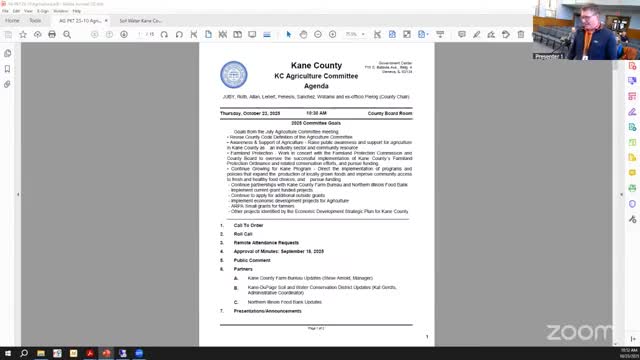Northern Illinois Food Bank warns SNAP cuts and work rules could sharply raise local demand
Get AI-powered insights, summaries, and transcripts
Subscribe
Summary
Northern Illinois Food Bank told the Kane County Agriculture Committee that a federal government shutdown and recent federal changes to SNAP eligibility and work requirements could leave tens of thousands in Kane County without benefits and sharply increase demand at local food pantries.
The Northern Illinois Food Bank warned Kane County officials on Oct. 23 that a continuing federal government shutdown and recent federal policy changes to the Supplemental Nutrition Assistance Program (SNAP) could leave tens of thousands of local residents without benefits and push unprecedented demand onto food pantries.
Robert Sio, representing the Northern Illinois Food Bank, told the Kane County Agriculture Committee that if the shutdown continues, November SNAP benefits may not be distributed until funding is restored. "If the shutdown continues, November SNAP benefits will not go out until that shutdown ends," Sio said.
Sio said about 60,000 individuals in Kane County receive SNAP and that roughly 1,900,000 people receive SNAP statewide; the food bank’s service area covers about 450,000 SNAP recipients. He said the food bank is preparing for a surge of new clients: when maximum COVID-era allotments ended in March 2023, the network saw roughly 100,000 additional client visits month over month, about a 20% increase.
"Food banks alone cannot meet this," Sio said, noting the scale difference between emergency food distribution and SNAP. "For every meal that we provide, SNAP provides nine." He estimated that a 20% increase in client visits would cost the food bank more than $1.3 million per month if it had to purchase the additional food.
Sio also outlined longer-term policy shifts from recent federal legislation he identified as "HR 1," saying that roughly 16,000 lawfully present immigrants in Illinois could lose SNAP eligibility under that law, and that renewed work requirements for able-bodied adults without dependents (ABAWDs) will begin counting months in December, with many people at risk of losing benefits in March if they do not meet exemptions.
Sio described administrative pressures at the Illinois Department of Human Services (IDHS), including the early termination of a statewide waiver of time limits and work requirements and a change from a midpoint self-attestation to a verification-based six-month recertification. He said those changes have increased the state’s implementation burden and risk of administrative error.
The food bank urged local coordination and preparations, including maximizing food-rescue partnerships with retailers and seeking additional fundraising. Anita Lewis of Marie Wilkinson Community Food Pantry described expanding store pickup schedules and said recent days had already produced unusually high client counts. "Yesterday we had record numbers for a Wednesday — 290 cars in three hours," Lewis said.
Sio urged state lawmakers to plan for the coming fiscal shifts: IDHS will face new administrative cost-sharing and, later, benefit cost-sharing that Sio said could require substantial state funding. He called for measured planning to avoid cutting other effective programs.
The committee responded with offers to assist with communications and food drives. Several county committee members volunteered to coordinate a competitive donation drive to benefit local pantries.
Ending: Committee members agreed to stay in contact with the food bank and partner agencies and to use county communications to alert local pantries and residents about potential shortfalls and response options.
